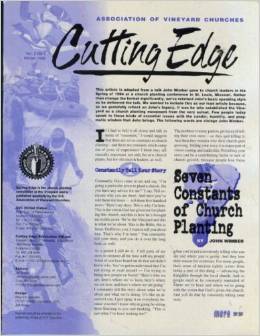Jeff Bailey: Worship and Spirituality in the New World

Cutting Edge 2:1 (1998)
Jeff Bailey, “Worship and Spirituality in the New World” Cutting Edge (Vol 4, No 2, Summer 2000), pages 16-18.
Jeff Bailey, co-editor of Vineyard Churches’ (USA) church planting magazine Cutting Edge, has been interviewing and conversing with a number of postmodern theologians in the last few issues. In the July 2000 issue of Cutting Edge, Bailey talks with Robert Webber about the postmodern threshold Webber sees Christianity crossing.
Webber recently took a post at Northern Baptist Seminary in Lombard, Illinois, having served as the professor of historical theology at Wheaton College for over 30 years. He is best known for extensive studies on worship including over 20 books, a monthly column in Worship Leader magazine and editing the Complete Library of Christian Worship.
Webber says that as Christianity enters post-modernism, theology must be rethought and ancient forms of worship must be reclaimed. He believes that postmoderns are looking for more visible and tangible ways of expressing faith, including symbols that touch spiritual realities. He says, “Christians in the postmodern world will succeed, not by watering down the faith, but by being a counter-cultural community that invites people to be shaped by the story of Israel and Jesus” (p. 16). However, from the excerpts given in this article, the ancient forms of worship he is suggesting reclaiming have more the flavor of early Gentile Christianity than the earliest Messianic Judaism.
Webber says that spirituality must be properly understood as turning our backs on evil and embracing Christlikeness, the essence of true humanity. One of the ways to become spiritual is then to rightly read the Bible. Too many of us have been duped into thinking that we cannot really understand what the author intended and therefore we do not read it to learn what God is saying to us. The Bible is God’s Word, it is what He intended. Therefore, we do need to do our homework on the background of the passage we are studying, but then we also need to read devotionally. For example, if we believed that out in front of where we lived was buried one billion dollars in gold, we would be making tremendous effort to locate it. We know that God’s Word is treasure, and we must go digging for the wealth it contains. Webber says, “As long as our interpretation doesn’t contradict the faith or ethics of the Church, I think we can say that we’ve heard from God” (p. 17).
Webber has some deep criticisms of modern evangelicalism. He says, “Evangelicalism is all about power: how to get it, how to use it, how to build big churches, how to have political influence … the opposite of what Jesus is all about. I often tell people, ‘Find out what church growth is telling you to do, and then do the opposite’” (p. 18). While evangelicalism may be experiencing much confusion as it transitions (or fails to transition) into a post-modern world, Webber’s definition is too biting for me. Anyone who is seeking power instead of serving in love is in the wrong. I, for one, cannot simply equate evangelicalism with power-mongering.
Category: Ministry, Winter 2001


